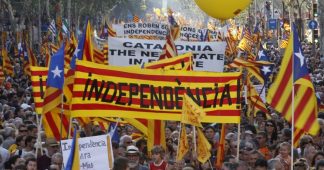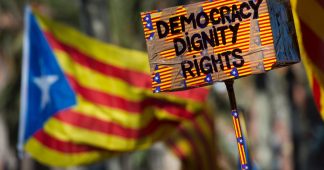The Case for Catalonia’s Secession from Spain
By Josep Desquens
April 1, 2003
“The life of the Catalan is an act of continuous affirmation […] It is because of this that the defining element of the Catalan psychology is not reason, as for the French; metaphysics, as for the Germans; empiricism, as for the English; intelligence, as for the Italians; or mysticism, as for the Castilians. In Catalonia, the primary feature is the desire to be.”
— Jaume Vicens Vives, Catalan historian
Many citizens of Flanders in Belgium, Scotland in the United Kingdom and Catalonia in Spain do not consider themselves merely part of a region but an independent nation that has no state of its own. Greater self-rule is the central objective of the so-called nationalist political parties characteristic of these European regions and the possibility of secession has been part of their politics for years. Yet while secession is mentioned as one option for the future, mainstream parties perceive it as a utopian formula rather than a viable alternative. This results partly from a genuine allegiance to the existing states by many of these regions’ residents, but also from the fear of the unknown and a surprising lack of information about the economic costs of remaining part of these states and the potential economic benefits of independence.
Current conventional wisdom in the European Union and the United States sees the issue of secession as something outdated or even dangerous. Mainstream politicians, diplomats and academics tend to present it as a senseless option at a moment in history where the focus is building a united Europe and a free-trade world. The thought of the wars in the former Yugoslavia makes many fear such an option. However, the situation in Catalonia, Flanders or Scotland is not comparable – these stateless nations are well-established democratic societies that respect human rights and free-market economies within the European Union. Thus, Catalans, Flemish or Scots cannot ignore that full political independence remains a serious option for them. The desire for secession needs to be objectively analyzed and the costs and benefits properly weighed.
Many Catalans do not consider themselves Spanish but exclusively Catalan. Such feelings raise eyebrows in other parts of Spain, Europe and elsewhere, but are widely accepted as legitimate within Catalonia. The key goal of Catalonia’s main political party, Convergència i Unió (CiU), which has governed the region for more than twenty years, is to gain higher levels of self-government. It defines itself as Catalan nationalist (or Catalanist) and frequently refers to the Catalans’ right to political self-determination. With this party’s support, the Catalan Parliament declared fourteen years ago that it would not renounce this right. Yet it does not seek full independence from Spain. Esquerra Republicana de Catalunya, which does publicly support full independence and is Catalonia’s fourth largest political force, held about 9 percent of the vote in the last regional elections. Polls on the issue reflect that a much higher percentage of the population sympathize with the idea of secession.
In Spain, this is a hot topic. The Autonomous Government of the Basque Country unveiled a “Sovereignty Plan” last year which calls for a referendum on the issue of self-determination once there is an end to the violence of ETA (Euskadi Ta Askatasuna), the region’s separatist terrorist group. The central Spanish government in Madrid is strongly opposed, arguing that the Spain’s Constitution does not foresee the right to self-determination for any part of the country. Recently, CiU made public a plan to reform Catalonia’s Statute of Autonomy that reaffirms the right to self-determination, claims Catalan representation in various international organizations and demands sole control of areas such as immigration and tax collection, among many others, which are today responsibility of the Spanish central government.
There are broadly three main arguments for the independence of Catalonia. The first is that since the Catalan cultural and language is neither understood nor accepted in Spain (and so neither protected nor fostered), the best way forward is an independent state. This results from three centuries of linguistic and cultural discrimination, which reached its pinnacle under Gen. Francisco Franco’s 36-year dictatorship. The second one says that a well-defined political entity such as Catalonia should be mature enough to govern itself with its own voice in the European Union or the United Nations in order to address the problems specific to it. Finally, there is the belief that Catalonia would be better off economically by seceding. In particular, proponents of the last argument refer to the fact that Catalonia pays much more into Spain’s central treasury than it gets back (subsequently referred to here as the fiscal imbalance) and to the excessive bureaucracy resulting from the current administrative arrangements.
The economic arguments are contested. Some believe an independent Catalonia would not be economically viable; others argue that it does not make sense given that globalization and the European Union have brought about the blurring of borders. But only a few seem willing to undertake a serious economic assessment of an eventual secession, as this has become a “politically incorrect” issue in Spanish politics.
The purpose of this article is to show that there are sound economic and administrative arguments supporting the case for Catalan independence and that there are no objective reasons to believe that a Catalan state could not be viable from an economic perspective. Secession would mean getting rid of the current fiscal imbalance with Spain, which has seriously hampered Catalonia’s growth and endangers its future economic performance. It would also mean simplifying the current oversized bureaucracy and having a direct voice in international forums. Moreover, I will argue that the processes of economic globalization and European integration are creating a new reality that reinforces, rather than weakens, the case for secession. Overall, evidence indicates that from an economic perspective, independence is the best solution for the people of Catalonia presently.
I will not touch upon the cultural arguments and I will not discuss whether an independent Catalonia would be morally legitimate or historically justified. Though there are strong historical and cultural arguments that justify going it alone, one could also argue that there are many others that support being part of Spain.
Catalonia: An overview
With roughly six and a half million inhabitants, the Autonomous Community of Catalonia is larger than four of the current fifteen member states of the European Union (Denmark, Ireland, Finland, Luxembourg ) and than seven of the ten new countries joining the E.U. community in 2004. It has approximately the same population and surface area as Switzerland.
Catalonia has an ancient history. Greeks, Romans and Phoenicians have all left their mark in the country. Arab influence was also notable, though less than in other parts of Spain as Arab rule was brief. In the Middle Ages, as a central component to the Crown of Aragon, it became one of the most important powers in the Mediterranean Sea. In the 15th century, it was united with the Kingdom of Castile through a royal marriage. Yet the result was not a common state, but a confederation of states with separate parliaments, laws, and language. In 1640, the War of the Harvesters was fought against the increasingly centralist Castilian government. At the same time, Portugal (then also attached to Castile) fought for independence and won. Instead, Catalonia lost the war and was forced to cede its northern part to France. During the War of Spanish Succession in the 18th century, Catalonia supported the Habsburg pretender to the Spanish throne, who favored a federalized Spain, against the French Bourbon claimant, the future Philip V of Spain. Once again, Catalonia lost, and as a consequence, the new Bourbon king wiped out all Catalan institutions and forbade the official use of the Catalan language. This effectively ended the Catalan state structure and began a process of cultural assimilation that continued until the 20th century.
The Catalan national conscience reemerged in the 19th century, as nationalism surged throughout Europe. Initially a culturally focused movement that looked back at the medieval epoch of political glory and cultural and literary richness, it soon developed into a regionalist movement demanding greater political autonomy. During the early 20th century before the Spanish Civil War from 1936 to 1939, Catalonia enjoyed partial self-rule on various occasions and a Catalan Republic within the Iberian federation was proclaimed twice. However, with Franco’s victory in 1939, one of the darkest periods of Catalan history began.
Gen. Franco’s dictatorial regime is key to understanding Catalonia today. While all Spaniards were victims of Franco’s ruthless and institutionalized violation of human rights, Catalonia suffered a cruel and systematic attempt at cultural annihilation. It endured repression of individual and collective cultural rights, such as the prohibition of the use of the Catalan language, the public denial of the Catalan identity and the punishment for cultural expression.
The arrival of democracy in 1975 initiated a process of recuperation of the Catalan institutions, culture and language. Today, Catalonia has the highest level of self-governance that it has enjoyed since the Bourbon dynasty came to power three centuries ago. The Autonomous Government and Parliament have substantial responsibilities in areas such as education and culture, its own health care system, its own police, etc. After Germany and Belgium, Spain is the most decentralized country in the European Union, with the Basque Country, Navarre and Catalonia as the most autonomous regions.
Language is central to understanding Catalonia’s identity. Having survived three centuries of repression from Spain, it still has a vibrant and sophisticated literary scene and its language is used by about eight million, known by ten million and widely spoken at all levels of society. It is spoken not only in Catalonia, Valencia and the Balearic Islands (Autonomous Communities where it has the same legal status as Spanish), but also in the eastern part of Aragón, the Principality of Andorra (where it is the only official language), the historically Catalan territories of southern France and the city of Alguer (Alguerho, Italy). In fact, Catalan is more widely spoken than a number of other official E.U. languages, like Danish, Finnish, Slovak, Slovenian, Latvian, Lithuanian and Maltese. Yet it does not enjoy recognition by E.U. institutions, as all Spanish governments have consistently ignored Catalonia’s demand to press for this. There are numerous radio and TV channels, newspapers and magazines in Catalan, and, more than eight million books are edited in Catalan every year. This recovery of the Catalan language – thanks to a vigorous language policy and hefty funding – might look impressive by many counts. However, it faces very serious threats and is a main concern for many Catalans. Catalan is the weaker language in a bilingual society where Spanish is equally spoken.
Apart from its long-standing literary tradition, Catalonia has shown a high level of cultural creativity over the last century. Many painters (Dalí, Miró, Tàpies), architects (Gaudí, Bofill), musicians (Granados, Savall, de Larrocha) and opera singers (Carreras, Caballé) confirm Catalonia’s standing in art and culture. It still is a center of imaginative talent in areas like design, fashion and architecture, particularly focused in Barcelona, the capital.
The fiscal imbalance between Spain and Catalonia
The long history of Spanish centralism has resulted in Catalans, as opposed to other regions of Spain, traditionally valuing private initiative rather than the state in order to develop. This has led to Catalonia being a relatively rich and dynamic region within Spain, a country that is relatively poor by E.U. standards. Catalonia has a strong net of small and medium businesses and many micro-entrepreneurs. Containing about 16 percent of Spain’s population, it provides about 20 percent of its GDP and one-third of the total industrial production and exports. The region contributes about 25 percent of Spain’s total taxes, but public investment in Catalonia is scarce when related to either population or GDP contribution. The regionalized investment of the Spanish state in Catalonia from 1982 to 1998 represented only about 8.5 percent of the total.
Spain’s central government controls tax collection and decides the distribution of the fiscal revenues throughout the country. So Catalans pay taxes to Madrid in exchange for public expenditure in the region. The difference between what is paid by the region and what is received back in the form of public spending is the fiscal balance, which can be positive (a ‘fiscal surplus’ for Catalonia) or negative (a ‘fiscal deficit’ for Catalonia). Calculating the fiscal balance is not an easy task. There are technical difficulties: Many public services that benefit Catalan citizens are not provided directly in Catalonia but from Madrid (e.g. army, ministries) and so valuing this is complicated. As well, the Spanish central government appears not to make available all necessary data, although it is in theory obliged to do so according to a resolution from the Spanish Parliament. However a number of studies in recent years have estimated the Catalan fiscal balance with Spain, showing not only a deficit (i.e. pays more than it receives back) but one of the highest of any region in the European Union. I refer to this situation as the fiscal imbalance.
These studies estimate the Catalan fiscal imbalance with Spain to be between 7.5 percent and 10 percent of the Catalan GDP i.e. for every 100 euros of income created yearly in Catalonia, between 7.5 and ten never return. In absolute terms, the deficit is between about 6.7 billion and about 9 billion euros or around 1,240 euros annually per capita (using the median of the estimates, 7.9 billion euros).
This is a highly abnormal situation when comparing Catalonia to similar regions in other E.U countries. First, if we compare it to regions that have similar levels of per capita GDP, we find that it has by far the largest fiscal imbalance among its E.U. peers. Nine out of fourteen comparable regions – e.g. Aquitaine in France; Scotland in the United Kingdom; Umbria in Italy; and the Southern region in Sweden – enjoy fiscal surpluses in their respective states. In those carrying a fiscal imbalance (e.g. Lisboa-Vale do Tajo in Portugal), it is nowhere higher than 3 percent. A second useful exercise is to compare Catalonia to regions whose income per capita is approximately 20 percent higher than the average of their respective state, as is Catalonia’s. These areas include Ile-de-France, Bavaria, Baden-Württemberg, South East England, Stockholm, Emilia-Romagna and Lombardy. In this case, only the two Italian regions have a comparable fiscal imbalance – a situation that has created an unprecedented political uproar, mainly articulated through the Lega Nord political party, which is resulting in the reorganization of the Italian Republic through the process of so-called devolution.
The fiscal imbalance has been sustainable in the past because of Spain’s relatively closed economy. However, it is not sustainable in the context of globalization. Catalonia will never be globally competitive if it has to carry such a heavy fiscal burden. Catalan companies pay high taxes, only to receive few public services and low infrastructure investment. High taxes result in making the region less competitive, the low level of investment in infrastructure lowers productivity. Not only does it hamper economic growth and the modernization of the Catalan economy, but it also impoverishes Catalan citizens and damages their social and territorial cohesion. As Columbia University professor Xavier Sala-i-Martín puts it: the fiscal imbalance is “the major challenge facing the Catalan economy for its development in the next 25 years.”
Sala-i-Martín has shown that if the Catalan fiscal imbalance had been reduced by one-third over the last 25 years, assuming that the freed funds had been fully invested in infrastructure and education (leading to a higher growth rate), Catalonia would now be a frontrunner in Europe in per capita income – second only to Hamburg, London and Luxembourg. These are missed opportunities. Today, the independence question aside, the unfair fiscal treatment remains an enormous problem for Catalonia. As such it needs to be addressed in an open and informed way. Unfortunately, this is not happening. On the one hand, many people seem to have lost their sense of reality after so many years of permanent centralism. On the other hand, many politicians and commentators fear openly talking about an issue that has become ‘politically incorrect’ in Spain. They do not want to be compared with the Italian right-wing xenophobic Lega Nord, which has used such type of arguments in a highly demagogical manner.
In any case, one thing is clear: the fiscal imbalance is a key argument supporting secession. A fully independent Catalonia would not have to pay taxes to Madrid that are invested elsewhere. Instead, it could invest them to the benefit of Catalonia.
What solidarity?
The central argument supporting the past and present fiscal imbalance is a so-called inter-regional solidarity. There are also other less convincing arguments such as the populist claim that Catalonia has a historical debt to the rest of Spain, or the economically mistaken opinion that such a fiscal imbalance is necessary as a means to finance Catalonia’s large trade surplus with the rest of Spain. Let us focus on solidarity. The current inter-regional solidarity system has major structural flaws that have to be recognized. First and foremost, no solidarity system can compromise the economic health of the ‘donor,’ as the current one is doing. Second, the current system was designed when disparities between Spanish regions were much higher. Now, after 20 years in the European Union, this has changed significantly. Indeed, in comparing Spain to other E.U. countries we see that the regional differences in Spain are not as abysmal as claimed. Countries such as Germany, France, the United Kingdom and Italy have more substantial inter-regional disparities. Third, supporters of the status quo ignore that Catalonia, though rich, has one of the highest rates of intra-regional income disparity in Spain, both territorially and socially. These disparities are not tackled effectively under the current system. In this respect, it is important to highlight that if Catalonia were an independent state within the European Union, roughly half of its territory would be designated as a preferential area for E.U. structural funds. Catalonia is currently considered as a single unitary entity by the European Union and thus, given its overall level of income, is not eligible for these funds. It is in this predicament that significant parts of Catalonia that require public investment do not receive public aid neither from Madrid nor from Brussels.
Sala-i-Martín has referred to an interesting example that illustrates well the character of the present Spanish solidarity system. In 2000, the GDP per person in Catalonia was 21.9 percent higher than the Spanish average. In comparison, the GDP per person of the Autonomous Community of Castilla y León was 7.6 percent lower than the Spanish average. On the basis of this income differential, one could argue that there is a need for some kind of inter-regional transfer. The surprise comes when we assess the extent of these transfers: Catalonia’s Income per capita (after redistributions) was 4.3 percent higher than Spain’s average, while Castilla y León’s was 9 percent higher. In other words, despite producing over 30 percent more, the redistribution system results in Catalans ending up with a lower income per capita than Castilian-Leonese people. This supports the argument that the Spanish inter-regional transfer system is neither fair nor economically beneficial, but creates a welfare dependency that harms entrepreneurship and growth in the poorer regions.
The viability of an independent Catalonia
As mentioned before, many Catalans do not support secession because they believe that it would not be economically viable. Yet thus far, there are no convincing arguments to support such a statement.
The argument that Catalonia is too small to be an economically sustainable independent state is incorrect. Not only is there no serious economic theory arguing that a country’s economic success requires a minimum size, but the evidence suggests a different reality. Looking at the ten countries with the highest GDP per person in the world shows that the Catalan proverb “the good marmalade is in the small pot” is applicable to economics: Eight out of the ten richest countries in the world (measured by GDP per capita) have a population equal or lower to that of Catalonia’s six and a half million inhabitants. Another element of the economic inviability speech refers to the availability of natural resources: An independent Catalonia will not be able to prosper because it does not have sufficient natural resources. Again, this logic is flawed. There is no established correlation between natural resources and economic prosperity: Though there are examples supporting this relationship, such as Norway; there are others refuting it. Oil-rich Venezuela has proved that abundant resources can lead to economic disaster if improperly managed, while a relatively poor country in terms of resources, such as Japan, is one of the richest in the world. The use of natural resources is indispensable for economic development and a country that wants to grow will need to obtain them. The way to do so efficiently is through international trade, not giving up political independence to a larger country.
A central theme in the anti-secessionist economic discourse is based on the fact that Spain is the main market of Catalonia. Thus, seceding from Spain would result in an economic catastrophe because Catalonia would lose its main market. The flaw in this argument is that there is no reason to expect Spanish trade embargoes or a boycott of Catalan products, particularly in the E.U. context. Secondly, Spanish citizens buy Catalan products due to their quality and price and not for some abstract Spanish national solidarity. Therefore, as long as secession does not increase the prices or lower the quality of Catalan products, no loss of market should occur. Finally, this argument overlooks an important reality: It is normal for a country that its main market is a neighboring country, particularly in the case of small countries. The Netherlands and Denmark’s largest trading partner is Germany; Belgium’s is France; Portugal’s largest market is Spain, yet there is no suggestion that Portugal reunite with Spain.
Critics of secession can rightly argue that being part of Spain makes economic sense because it allows Catalonia to share the costs of public goods of the military, diplomatic representations, etc, among forty million people instead of six and a half million. Although this is undeniable, it overlooks two facts. First, the huge regional fiscal imbalance shows that today Catalans are paying for these services twice what they would pay in a separate Catalan state. Second, the cost of some of these public goods (e.g. monetary system, antitrust regulation) is being transferred to the E.U. supranational level (i.e. financed by all E.U. citizens).
In conclusion, there is no objective economic reason to believe that a hypothetical Catalan state should not be viable from an economic perspective. If Slovenia has performed well since seceding from Yugoslavia with its much smaller and less diversified post-communist economy, an independent Catalonia should also be able to do well economically. In the end, the success of a Catalan state will depend on its own government. Independence will be good for Catalans only if the Catalan state would be able to pursue sound macroeconomic policies that foster growth and economic welfare. While it is uncertain how well a Catalan government could manage its economy, we know that the performance of the Spanish government over the last century has been overall poor. Moreover, as independence would mean getting rid of the aforementioned fiscal imbalance with Spain at once, a Catalan state would enjoy significant room to maneuver.
Globalization
It is often heard in Europe that it does not make sense to talk about the secession of stateless nations in the context of globalization. It is claimed that in an era of fading borders and boundaries, it is not the time to build new ones. This type of conventional discourse results in avoiding an open and objective discussion about the possibility of an independent Catalonia, Basque Country, Scotland, Flanders or any other European stateless nation.
As shown by Harvard University professor Alberto Alesina and his colleagues, the reality is rather the opposite: “Trade liberalization and political separatism appear to go hand in hand.” The increase in free international trade directly relates to the economic viability of new states. Globalization makes the independence of Catalonia more viable because it guarantees access to international markets. Likewise, it makes secession much more desirable for the health of its economy, as fewer bureaucratic layers would increase Catalan competitiveness in global markets. In a context of international trade restrictions, large countries enjoy economic benefits because political borders determine the size of the market. In this context, small nations such as Catalonia find belonging to a larger state such as Spain to be in their economic interest because it gives them access to a larger market. Thus, from a purely economic point of view, being part of Spain has benefited Catalonia.
In a world of increasingly free trade and global markets, this rationale is no longer valid. Relatively small cultural, linguistic or ethnic groups have the possibility to benefit from creating new political entities that trade in economically integrated wider areas. With its own state, Catalonia could benefit from improved administrative efficiency and still have access to foreign markets in which to sell its products. In other words, free trade is a good substitute for a political union as a way to access bigger markets in the context of globalization.
It is important to highlight here that small countries appear to be among the main beneficiaries of freer trade. That should not surprise us if we look at the small European countries that have traditionally been active traders, like the Northern Italian city-states and the Low Countries. Professor Alesina has suggested that population explains a third of a country’s openness to trade (i.e. trade relative to GDP). A study by the World Trade Organization (WTO) of 127 countries (both developed and developing) finds a clear relationship between the size of a country and its openness to trade. While the benefits of being a small country (e.g. easier to manage, greater homogeneity, specialization) remain, the drawbacks are decreasing with free trade and new technologies.
In addition, globalization is also compromising many of the traditional functions of mid-sized countries such as Spain, making them less desirable to their citizens – in particular, to differentiated groups such as the Catalans. On the one hand, these states are not big enough to solve global problems involving issues like international terrorism, international capital movements, regulation of transnational corporations, the HIV/AIDS epidemic or global warming. On the other hand, they are still too large to solve local problems. If Spain is not big enough to tackle global problems and not small enough to properly deal with Catalan specificity, then it should change or disappear. So far, it has shown no willingness to change. As professor Sala-i-Martín puts it: “at the end of the day, states and governments should serve the people and not the other way around.”
The European Union
The process of European integration, supposedly based on the principle of subsidiarity, has long been at the center of the European stateless nations’ ambitions to increase their degree of political autonomy. It is argued that talking about secession in the context of European integration is senseless because this process should lead to the disappearance of current borders and nation-states as we know them today. It is claimed that Europe will naturally become a loose confederation of independent regions.
These expectations are, however, proving unrealistic. Indeed, the principle of subsidiarity creates a perception problem: While for the majority of E.U. states (with the notable exception of Germany) it applies only to the relationship between the European Union and its member states, for these stateless nations it also fully applies to their administrative relationship with their respective states. Thus, in Catalonia the process of European integration has raised expectations of higher levels of political power that are not being matched by reality. In fact, expressions such as “Europe of the regions,” so often heard in Barcelona, are rarely used in Madrid. Because for virtually all state governments, the E.U. project is to be built on the existing nation-states and the transfer of political power to the regions should never undermine the pivotal role of these central governments. The development of the current European Convention, which is drafting an E.U. Constitution, appears to confirm such position. Plus ça change …
Even though the E.U. nation-states are not willing to give more power to their regions in the name of the principle of subsidiarity, the process of elevating state responsibilities to the European supranational level is clearly undermining their own raison d’être. The Spanish state has given up its sovereignty in key areas such as trade policy, antitrust regulation, environmental legislation and – through the European Monetary Union – monetary policy. Today, the number of functions that it undertakes for Catalan citizens has significantly diminished. In this context, it is legitimate for Catalans to ask themselves whether the remaining attributes of the Spanish central government (e.g. fiscal policy) could not be better managed by the Catalan government, one closer to them, with greater knowledge of their needs. The evidence shown above in relation to the fiscal imbalance seems to indicate that Catalonia would be better off if it could undertake those directly itself.
The process of European integration also provides a significant argument for the independence of Catalonia, Flanders or Scotland: administrative efficiency. The maintenance of the state’s intermediary role between the European and local powers results in higher transaction costs that hamper economic development. Particularly in federal or semi-federal states like Spain or Belgium, keeping a central state that has less and less to offer to its citizens is becoming more expensive to maintain and very complex to manage. Thus, secession appears as an economically desirable option because it would result in lower costs and complexity that would reduce the burden carried by the Catalan economy.
We have seen how the European Union is calling into question the existence of old centralized European states such as Spain. In this context, becoming a small less bureaucratic state within the European Union would result in increased economic efficiency. It would also be the best way for Catalan interests to be represented in the process of European construction – as opposed to being represented by a Spanish government that has repeatedly refrained from defending important Catalan interests (e.g. language official recognition). Finally, the European Union is de facto lowering the potential cost of independence by providing Catalonia with a free trade area, as well as saving the need to incur costs such as creating a new currency.
Final reflections
Unlike many nations in Europe that have flourished due to the creation of a nation-state, Catalonia exists despite a unitary and centralist Spanish state that has repeatedly tried to eliminate it as a separate cultural entity. In this context, the mainstream Catalan nationalist movement – in particular, since the end of Franco’s dictatorship’s attempt at linguistic genocide – has traditionally focused on cultural and linguistic promotion. At the same time, it has allowed a damaging fiscal relationship with Spain to develop that might have led to a civil uproar in other countries. Years of permanent centralism have atrophied the perception of reality of many Catalans, making them accept this administrative relationship as perfectly normal even when it goes against their interests. Today, culturally-focused policies are insufficient. Catalan politicians need to ensure the continuity of the culture and language, but they also need to inform Catalans openly that they are paying a high price to be part of a unitary Spanish state. They have to make all Catalan citizens aware of the fact that, in the name of a questionable solidarity, the current fiscal imbalance results in serious public under-investment that will hurt their economy. And, more importantly, they need to tell them that this is a problem that affects all Catalans equally: first-generation and tenth-generation Catalans; Catalan-speakers, Spanish-speakers and Arabic-speakers; employers and employees; men and women; students and retirees. It is urgent that Catalans realize that only with a new administrative structure can Catalonia be competitive in the international markets and guarantee better public services, modernization of its infrastructure, social cohesion and economic growth. Among all possible options, it is independence that makes more sense economically, particularly in the context of globalization and the European Union. Why? First, secession would guarantee that the existing unfair fiscal imbalance would be eliminated. Second, an independent Catalonia would result in a smaller more efficient public administration. Third, a Catalan state would still have access to international markets in a free-trade world. Finally, full independence would mean a direct voice in the international forums that so much influence their lives.
No referendum on the question of independence will be a fully rational exercise. Independence from Spain is not simply a matter of economics or administrative rationality. Identity issues, in Catalonia and elsewhere, are highly complex. Some might want to be part of Spain even with an unfair fiscal treatment; others might want independence even if the cost is high. However, this does not negate the fact that economically, independence would not only be viable, but also significantly advantageous. Catalans might want to vote from their pockets rather than from their hearts.











